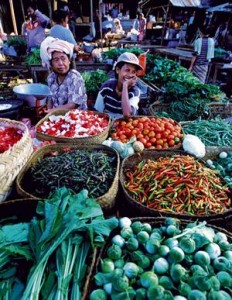Tejo Pramono, Jakarta
The plan of President Susilo Bambang Yudhoyono’s administration to open a food estate in the eastern part of Indonesia will create a new dimension in the agriculture sector. For Yudhoyono’s agriculture teams, the plan marks a breakthrough in agricultural development because it will bring private investment into the on-farm food sector.
The government says it will contribute to economic growth and will guarantee national food availability. It also argued that it could contribute to world efforts to solve the food crisis.
But behind food estate policy, there is a deep lack of vision on peasant farmers and hunger among the policy makers and agricultural intellectuals. They simply see the problem of hunger and food insecurity from the supply management approach. They are disconnected with the realities that small farmers and rural workers are facing hunger in their daily life. Research revealed that landless farmers and peasant farmers in Indonesia spent more than 70 percent of their income on food.
When the production of food is in the hands of big agribusiness corporations, the fulfillment of domestic needs are often ignored. As the agribusiness book told, the production will only go to the higher price taker. That theory became reality in Indonesia during the food crisis in 2008 when palm oil producers did not want to sell their product domestically. Domestic market obligations (DMO) as the government imposed to the palm oil producers were largely ignored because the international price is higher. It is ironic that people of Indonesia, which is the world’s largest oil palm producer, are facing severe shortages of cooking oil.
The food estate plan also does not respect world efforts to solve the global environment crisis, including climate change. Converting 1.6 millions areas in food estate, a monoculture model, will be a disaster for our biodiversity. Local seeds will become extinct when new varieties are introduced in large scale areas.
The use of new varieties will also disturb the ecosystem in regions, that is frequently followed by the outbreak of pests, resulting in large use of pesticides. Once it is applied it will be followed by the disturbance of the natural predatory system and in longer time it will pollute the hydrology cycle.
It seems very clear now that with 1.6 millions hectares of land, it will be converted into a monoculture food estate. The Indonesian proposal to UNFCCC to reduce its emission up to 26 percent is without any clear plan at all.
Worse, the plan of the Yudhoyono administration for food estate will only contribute to global land grabbing, in which big corporations invest in the agricultural sector to have more control of agro-fuel and food.
Instead of providing land to big corporations, the government has better choice, which is redistributing land to the millions of landless and peasant families so they can work again to feed their family. While local ecosystems can be safe using agro-ecological models, it can only be done through diversifying small scale farming.
The writer is an agroecology activist and staff at the secretariat of La Via Campesina, a trans-national peasant and family farmer movement.













